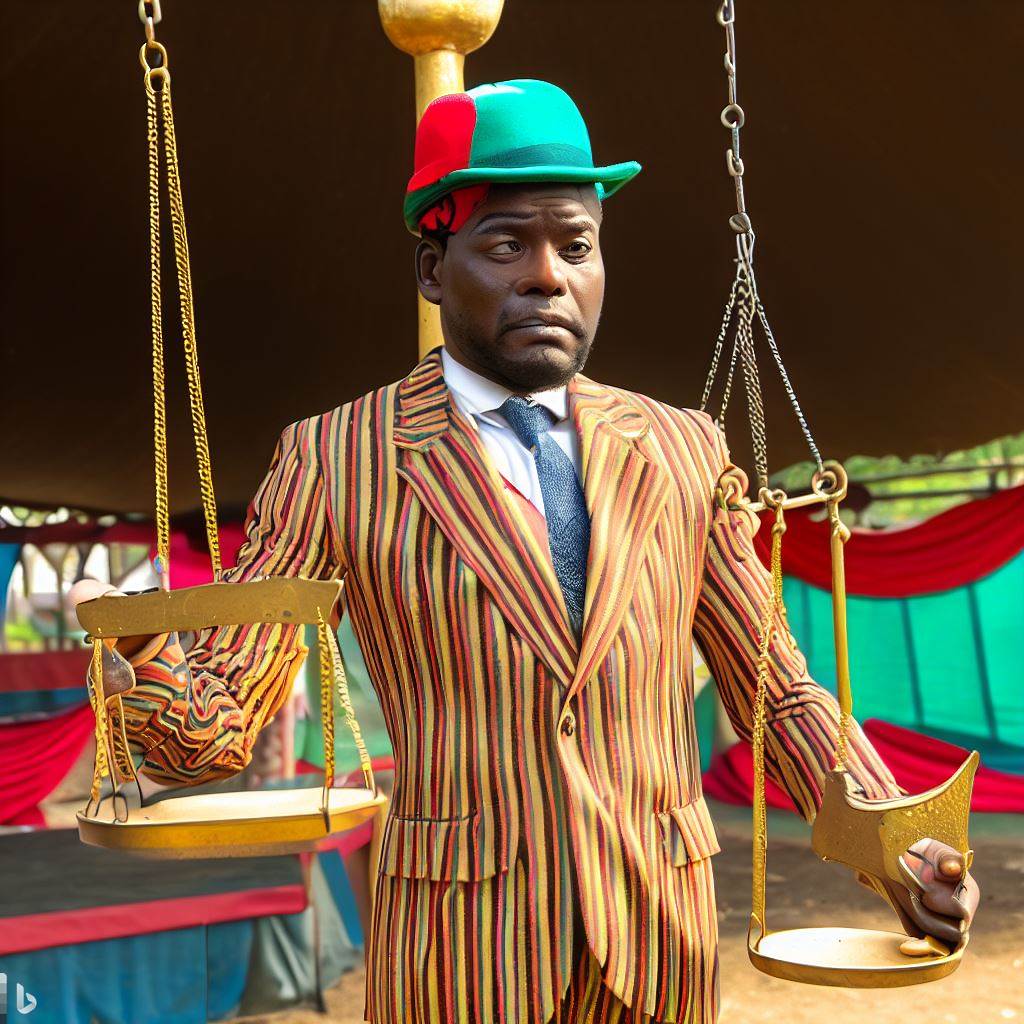Introduction
Becoming a music director in Nigeria offers exciting opportunities in the growing music industry.
With Nigeria’s vibrant music scene, there is a high demand for skilled professionals to direct and shape musical productions.
The music industry in Nigeria has experienced significant growth in recent years, making it one of the most prominent in Africa.
This growth has led to increased opportunities for individuals interested in pursuing a career as a music director.
From traditional music to contemporary genres like Afrobeat and Afropop, Nigeria offers a diverse range of musical styles and artists.
A music director plays a vital role in the industry, as they are responsible for overseeing the artistic and creative aspects of musical productions.
They work closely with musicians, composers, and producers to bring their vision to life.
A music director’s responsibilities include arranging music, conducting rehearsals, coordinating performances, and ensuring the overall quality of the music.
The role of a music director is crucial in shaping the sound and direction of a musical project.
They have the ability to guide and influence the overall artistic direction, making them an indispensable part of the music industry in Nigeria.
Pursuing a career as a music director in Nigeria offers exciting opportunities in a thriving music industry.
With the growing demand for skilled individuals, aspiring music directors can play a crucial role in shaping the Nigerian music scene.
Education and Qualifications
Educational background required to become a music director
- To become a music director in Nigeria, a strong educational background is essential.
- A music-related degree or certification is highly relevant in this field.
- Continuous learning and practical experience are vital for a successful career as a music director.
- Several institutions and courses in Nigeria offer music-related programs, enabling aspiring music directors to gain the necessary knowledge and skills.
The relevance of a music-related degree or certification
When pursuing a career as a music director in Nigeria, having the right educational background is crucial.
Although there is no specific educational requirement to become a music director, having a strong foundation in music is highly beneficial.
One of the most relevant educational qualifications for a music director is a music-related degree or certification.
These programs provide a comprehensive understanding of various aspects of music, including music theory, composition, arrangement, conducting, and performance.
They also equip individuals with the necessary skills to lead and direct musical ensembles.
The importance of continuous learning and gaining practical experience
Continuous learning is essential for individuals aspiring to become music directors.
The music industry is constantly evolving, and keeping up with new trends, techniques, and technologies is crucial.
Additionally, gaining practical experience through internships, apprenticeships, or participation in musical productions allows individuals to apply their theoretical knowledge in real-world scenarios.
In Nigeria, several institutions offer music-related programs that can pave the way for a career as a music director.
Specific institutions or courses in Nigeria that offer music-related programs
These include:
- University of Lagos The Department of Creative Arts offers Bachelor of Arts degrees in Music, which covers various aspects of music study and performance.
- Ahmadu Bello University The Department of Music offers a Bachelor of Arts in Music degree, providing students with a comprehensive music education and performance opportunities.
- Obafemi Awolowo University The Department of Music offers a Bachelor of Arts in Music degree, focusing on music theory, composition, performance, and conducting.
- Dominion University The Department of Music offers music-related programs, including a Bachelor of Arts in Music degree and a diploma in Music Education.
- Music Society of Nigeria (MUSON) School of Music Offers a variety of music programs, including courses in music theory, performance, and composition.
- Tenstrings Music Institute Provides music production and audio engineering courses, enabling individuals to gain practical skills in music direction.
These institutions and courses in Nigeria provide individuals with the opportunity to obtain the necessary education and qualifications to pursue a career as a music director.
By combining theoretical knowledge with practical experience, aspiring music directors can hone their skills and increase their chances of success in this competitive industry.
Read: Celebrating Nigeria’s Foley Artists: Unsung Heroes of Sound
Developing Musical Skills
Aspiring music directors in Nigeria must understand the significance of developing strong musical skills.
In order to excel in this career path, expertise in music theory, arrangement, and composition is of utmost importance.
Additionally, learning various instruments and being able to read sheet music plays a crucial role, as does gaining experience in different music genres.
1. Musical Skills The Foundation for Success
- Developing musical skills is essential for any individual aspiring to become a music director.
- These skills form the foundation upon which a successful career in music directing is built.
- Music directors must have a deep understanding of music theory, enabling them to create harmonies and melodies.
2. Expertise in Music Theory, Arrangement, and Composition
- Music theory is the language of music and serves as a guide for music directors.
- An in-depth knowledge of music theory allows directors to effectively communicate ideas to musicians.
- Arrangement and composition skills are vital in creating captivating musical pieces and orchestrations.
- Directors need to possess a deep understanding of musical structure and be able to arrange music for different instruments.
3. Learning Different Instruments and Reading Sheet Music
- A music director needs to have proficiency in playing multiple instruments.
- This allows them to communicate with and guide musicians during rehearsals and performances.
- The ability to read sheet music is essential for understanding complex musical compositions.
- Directors who can read sheet music quickly grasp the nuances of a musical piece, facilitating better interpretations.
4. Gaining Experience in Different Music Genres
- Music directors should strive to gain experience in a wide range of musical genres.
- This exposure allows directors to develop a versatile style and adapt to various music styles and preferences.
- Working with different genres also expands their musical knowledge and strengthens their creative abilities.
- By understanding diverse genres, directors can better cater to the preferences of artists and audiences.
Developing musical skills is of utmost significance for individuals pursuing a career as a music director in Nigeria.
A strong foundation in music theory, arrangement, and composition, coupled with proficiency in playing different instruments and reading sheet music, paves the way for success in this role.
Additionally, gaining experience in various music genres enhances a director’s versatility and creative abilities.
With these skills, aspiring music directors can confidently pursue their career path and contribute to the vibrant music industry in Nigeria.
Read: Building a Foley Studio in Nigeria: Costs and Considerations

Gaining Industry Experience
The Importance of gaining practical experience in the music industry
Practical experience is paramount in the music industry for aspiring artists, producers, and professionals of all kinds.
- Skill Refinement: Hands-on experience hones skills, making individuals more proficient and adaptable in their roles.
- Industry Insights: Practical exposure provides invaluable insights into the workings of the music business, from studio to stage.
- Networking Opportunities: Real-world experience fosters connections with industry insiders, potentially opening doors to collaborations and opportunities.
- Creative Growth: Immersion in music production or performance nurtures creativity, enabling artists to refine their craft and develop a unique voice.
- Problem Solving: Practical challenges equip individuals with problem-solving skills crucial for navigating the music industry’s complexities.
- Understanding the Audience: Live performances and studio work offer a deeper understanding of audience preferences and reactions.
- Confidence Building: Practical experience boosts confidence, essential for artists to perform on stage or negotiate deals effectively.
- Resume Enhancement: Employers and collaborators value hands-on experience, making candidates more appealing in a competitive field.
- Learning from Mistakes: Practical exposure allows individuals to learn from mistakes, an essential part of personal and professional growth.
- Career Advancement: Practical experience often leads to career progression, as professionals apply their knowledge to more significant roles.
Practical experience is the cornerstone of success in the music industry.
It equips individuals with the skills, knowledge, and confidence needed to excel in a dynamic and competitive field, transforming musical dreams into a thriving reality.
The role of internships, apprenticeships, and entry-level positions in building a career
The music industry in Nigeria is highly competitive, and gaining practical experience is essential for aspiring music directors.
Here are some important steps to consider:
- Internships, Apprenticeships, and Entry-level Positions: These opportunities provide hands-on experience and a chance to learn from industry professionals.
They help build necessary skills and knowledge. - Networking with Industry Professionals: Building connections with professionals in the music industry is crucial.
Attending industry events, joining relevant associations, and connecting on social media can open doors to potential opportunities. - Attending Workshops, Competitions, and Music Conferences: These events offer valuable learning experiences and networking opportunities.
They provide exposure to the latest trends and allow musicians to showcase their talents. - Benefits of Gaining Practical Experience: Practical experience allows music directors to understand the dynamics of the industry, learn from real-life situations, and develop problem-solving skills.
It also helps in building a strong portfolio. - Staying Updated: The music industry is constantly evolving, and it’s important to stay updated with the latest trends, technologies, and industry news.
This can be achieved through continuous learning and attending industry-related events. - Showcasing Talent: Gaining industry experience enhances a music director’s ability to showcase their talent effectively.
It helps in building credibility and gaining recognition in the industry.
Benefits of networking with industry professionals and joining relevant associations
Networking with industry professionals and joining relevant associations can significantly boost your career in various ways.
- Access to Opportunities: Networking opens doors to job openings, collaborations, and projects you might not find otherwise.
- Knowledge Exchange: Engaging with professionals facilitates the exchange of industry insights, trends, and best practices.
- Mentorship: Networking can lead to mentorship, allowing you to learn from experienced experts in your field.
- Credibility: Membership in industry associations enhances your professional credibility and reputation.
- Skill Enhancement: Workshops and seminars offered by associations can help you develop new skills and stay updated.
- Industry Updates: Associations often provide newsletters and resources to keep you informed about industry developments.
- Advocacy: Associations advocate for your interests and contribute to industry improvements and standards.
- Networking Events: Attend association events to meet like-minded professionals and expand your professional circle.
- Career Advancement: Networking can lead to promotions and career advancements through referrals and recommendations.
- Personal Growth: Interactions with industry professionals and association involvement foster personal and professional growth.
Networking and joining industry associations are invaluable steps to supercharge your career. They offer a wealth of opportunities, knowledge, and support that can elevate your professional journey to new heights.
Gaining practical experience in the music industry is a stepping stone towards becoming a successful music director in Nigeria.
It not only provides essential skills and knowledge but also opens doors to valuable networking opportunities.
Expand knowledge and connections
By actively participating in internships, workshops, and industry events, aspiring music directors can enhance their abilities and build a strong foundation for their careers.
Attending workshops, competitions, and music conferences can be trans-formative in expanding knowledge and building connections within the music industry.
Read: The Evolution of Foley Artistry in Nigerian Film Industry
Building a Professional Network
The significance of building a strong professional network as a music director
Building a strong professional network is of utmost significance for a music director. It plays a vital role in their success and growth in the music industry.
By actively participating and engaging with other industry professionals, a music director can unlock numerous opportunities and enhance their career.
The role of attending music industry events, joining forums, and participating in online communities
Attending music industry events is a great way to build connections and expand one’s network.
These events provide a platform to meet and interact with like-minded individuals who share a passion for music.
By attending conferences, concerts, and workshops, music directors can establish relationships with industry veterans and gain valuable insights into the music industry.
Joining forums and participating in online communities is another effective strategy to build a professional network.
Online platforms provide a virtual space to connect with musicians, producers, and other industry professionals from across the world.
Engaging in discussions, sharing experiences, and seeking advice can help music directors broaden their knowledge and expand their network.
Importance of collaborating with musicians, producers, and other industry professionals
Collaborating with musicians, producers, and other industry professionals is essential for a music director.
This collaboration not only enables them to learn from each other but also opens doors to new opportunities.
The benefits of maintaining relationships and staying updated on industry trends
Working with different artists and producers allows music directors to showcase their talent, gain exposure, and build a reputation in the industry.
Read: Animation Festivals in Nigeria: A Director’s Diary
Career Opportunities and Growth
The various avenues available for music directors in Nigeria
In Nigeria’s vibrant music industry, music directors have a multitude of exciting avenues to channel their creativity and expertise.
- Music Video Production: Music directors can collaborate with artists to conceptualise and direct music videos, creating visual narratives that enhance the music.
- Live Concerts and Tours: They can curate live shows and tours, overseeing the entire production to ensure an unforgettable live experience for fans.
- Soundtrack Composition: Music directors can venture into composing soundtracks for movies, TV series, and advertisements, adding depth to visual storytelling.
- Music Supervision: They have the opportunity to become music supervisors, selecting and licensing tracks for films, TV shows, and commercials.
- Artist Development: Music directors can guide emerging talents, helping them shape their musical careers and develop their unique style.
- Music Production: They can also produce albums and singles, working closely with artists to achieve the desired sound and quality.
- Studio Ownership: Owning a recording studio provides music directors with a space to nurture talent and create music.
- Music Education: Teaching and mentoring aspiring musicians and directors is another rewarding path for music directors.
- Music Consulting: They can offer expert advice to businesses and brands seeking to integrate music into their marketing and branding strategies.
- Music Curation: Curating playlists for streaming platforms and radio stations allows music directors to influence what audiences listen to.
Nigeria’s music industry is dynamic and constantly evolving, offering music directors a rich landscape to explore and make their mark.
The opportunities in live performances, recording studios, television, and film industry
- Music Directors in Nigeria have various avenues available to pursue their career.
- Live performances offer great opportunities for music directors to showcase their talent and gain recognition.
- Recording studios provide a platform for music directors to work on albums and singles for artists.
- The television and film industry offers music directors the chance to create soundtracks for movies and TV shows.
- Music directors have the potential to work with top Nigerian artists, helping them shape their musical vision.
- Collaborating with international artists expands the horizons of music directors, creating opportunities for global recognition.
- With the rise of Nollywood and Nigerian music industry, music directors have tremendous growth potential.
- As the music industry continues to evolve, music directors can advance their career by staying updated with trends.
The potential to work with top Nigerian artists and potential for international collaborations
In Nigeria’s booming music industry, aspiring artists and producers have the potential to collaborate with top-tier talents.
- Collaborating with Nigerian Icons: Emerging artists can leverage connections and talent to work alongside music legends.
- Cross-Genre Collaborations: The Nigerian music scene is diverse, offering chances to fuse styles and create groundbreaking music.
- International Collaborations: Nigerian artists have gained global recognition, opening doors for international collaborations with musicians worldwide.
- Expanding Fan Base: Collaborations can introduce artists to new audiences, expanding their reach and influence.
- Cultural Fusion: International collaborations allow for the fusion of diverse cultures, resulting in fresh and exciting musical experiences.
- Creative Exchange: Working with international artists fosters a creative exchange of ideas, pushing boundaries and innovation.
- Networking Opportunities: Building relationships with top talents opens doors to more collaborations and career growth.
- Exposure to New Markets: Collaborating internationally exposes artists to foreign markets, potentially leading to international success.
- Learning and Growth: Artists can learn from each other, gaining new skills and insights during collaborations.
- Legacy Building: Successful international collaborations can cement an artist’s legacy in the global music industry.
In a world where music transcends borders, Nigerian artists have the potential to leave an indelible mark by collaborating with both local icons and international stars.
The potential for growth and advancement in a music director career
A career as a music director in Nigeria offers numerous opportunities and avenues for growth.
From working with top Nigerian artists to international collaborations, music directors have the potential to elevate their careers and make a lasting impact in the music industry.
Gain More Insights: How to Build a Music Career in Nigeria
Conclusion
To become a music director in Nigeria, it is crucial to emphasise the significance of education, skill development, and industry experience.
These elements form the foundation for a successful career in this field.
Aspiring music directors should ardently pursue their passion and take proactive steps towards their career goals.
Individuals achieve musical expertise through formal education, skill honing, collaborating with pros, and engaging in diverse projects.
Embarking on a career as a music director in Nigeria can be both challenging and rewarding.
It requires dedication, perseverance, and a strong commitment to continuous growth and learning.
However, the fulfilment that comes from contributing to the creation of music and directing performances is extremely gratifying.
Therefore, to all those aspiring music directors out there, do not hesitate to chase your dreams.
Believe in your abilities and seize every opportunity that comes your way.
With the right mindset and determination, you can carve a successful and fulfilling career as a music director in Nigeria.




